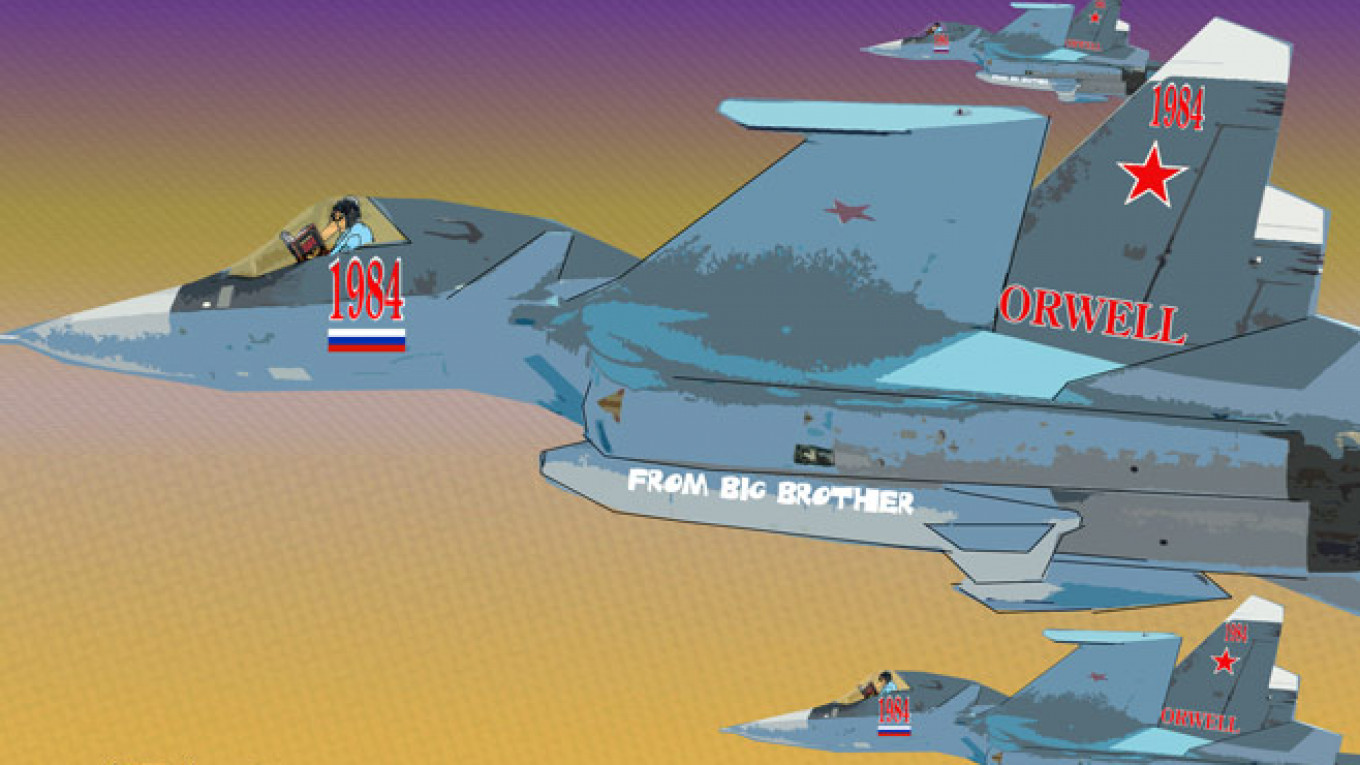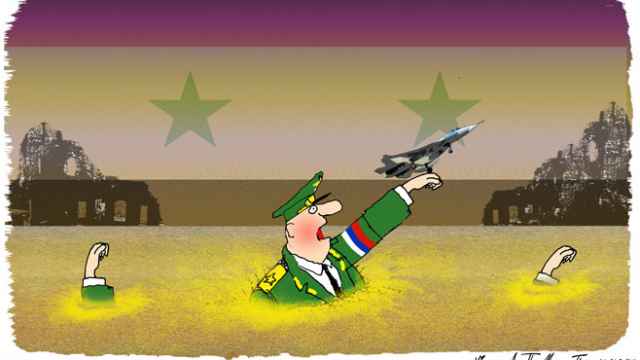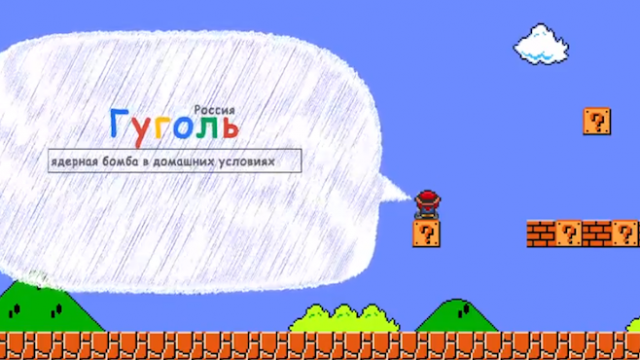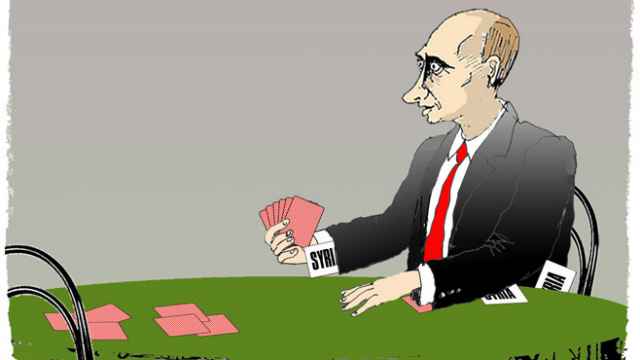The Russian authorities have achieved remarkable success in the Syrian war. According to a poll by state-run VTsIOM, 66 percent of citizens approve of sending Russian combat aircraft to Syria, even though more than half have no idea what Moscow is fighting for there.
Think about it: The majority of Russians approve of the war without even taking the trouble to understand its purpose. It's just that the average citizen gets a big kick out of watching television footage of Russian planes locking in and destroying their targets exactly as if it were a video game. The armchair audience likes watching the General Staff issue its daily report listing the number of terrorist command and control centers destroyed and the ever-increasing number of terrorists killed.
It seems as if the producers at state-controlled television channels are using George Orwell's "1984" as a handbook. The modern-day Orwellian war of Oceania against Eurasia — aka Russia versus fascist Ukraine — is already over and forgotten, and now Moscow has launched a new battle between Oceania and what Orwell called Eastasia.
And yet, the Defense Ministry does not even try to give a semblance of plausibility to its communiques of military triumph. After all, what type of aerial reconnaissance could confirm that Russian aircraft have destroyed a factory producing belts for suicide bombers? Do those belts explode differently than other munitions, or can Russian drone aircraft peer into windows and straight through brick and concrete walls?
The fact that Russians gave such enthusiastic support to the annexation of Crimea and Moscow's "secret war" in Ukraine revealed their deep inferiority complex over the collapse of the Soviet Union. The seizure of Crimea and the hybrid war in Donbass served as potent psychotropic drugs that allowed Russians to finally feel like citizens of a great empire — and therefore happy. However, like any powerful drug, it proved addictive. A new dose was needed. And one appeared, in the form of a safe little war in Syria that carried no risk for Russia.
That drug works on Russia's ordinary citizens and military chiefs alike. To help celebrate President Vladimir Putin's recent birthday, they launched 20 of Russia's most advanced Caliber cruise missiles from the Caspian Sea fleet to hit terrorist targets in Syria. Military observers were simply overcome with joy. For the first time in its military history, Russia used long-range cruise missiles to hit targets 1,500 kilometers away. That was a convincing demonstration of "the long arm of Moscow" and its long-awaited ability to "project force" abroad.
Of course, those same analysts who are simply bubbling over with happiness begin to stammer and mumble when trying to explain why those missile attacks were necessary in the first place.
It was clear why the United States used cruise missiles in its operations in Yugoslavia and Iraq — namely, to employ its full military might to send the enemy into confusion, destroy its reserves, interrupt communications and diminish its will to resist.
Russia's air operations are a bit different. In a campaign that is far from intense, the air squadron stationed in Syria carries out extremely limited strikes against targets that are most likely selected by the Syrian army. There are no targets in Syria that Russian aircraft cannot reach, and so there was no need to use cruise missiles against them.
The show that Russia has staged in Syria is essentially a historical reenactment of U.S. operations in Iraq. I can imagine how humiliated and envious Putin must have felt 12 years ago as those damned Yankees sent volley after volley of cruise missiles to destroy pinpoint targets thousands of kilometers away. Now Putin has shown that not only can Russia play that game, too, but under his visionary command, can perhaps outperform the Yankees.
Putin was not the only one to indulge his militaristic fantasies. Retired admiral and Duma Defense Committee head Vladimir Komoyedov argued that there was simply no stopping those "Komsomol volunteers" in their desire to ensure the happiness of the Syrian people. He implied that Moscow should create brigades, or perhaps even a battalion of volunteer Russian forces, and that fighters languishing in the Donbass for lack of a war could immediately relocate to Syria.
He even suggested that those intrepid Russian volunteers, so eager to bring happiness to their downtrodden Syrian brethren, could earn paychecks far surpassing standard military salaries. What Komoyedov forgot to mention is that "volunteers who fight for money" are actually called mercenaries.
Many years ago, after the tragedy in Vietnam, the U.S. developed the so-called "Powell Doctrine" that spells out criteria for the use of military force abroad. According to that doctrine, U.S. leaders can resort to military force only when, among other things, they have a clear and attainable military objective. However, Russia's war in Syria is primarily a propaganda stunt and lacks an end goal that could be achieved by military means.
What's more, it is fraught with the risk of entanglement. If the current air operations do not secure victory for the forces of Syrian President Bashar Assad and his Iranian colleagues, Russia's military chiefs might risk launching ground operations. In fact, such plans were already developed as part of the large-scale Center 2015 military maneuvers. First, an airborne regiment flies in and prepares a base for the main forces. They are followed by a division of troops, and then the general army.
True, it is not clear how Moscow plans to deploy infantry to Syria, but in the end, it can commandeer civilian aircraft. It was a stroke of luck in this regard that private Russian air carrier Transaero went bankrupt recently, allowing state-controlled Aeroflot airlines to buy a 75 percent stake in the company.
Russia's military brass continues to insist that it has no plans for ground operations in Syria. However, for some reason the Defense Ministry hurriedly pushed through amendments to the law on the punishment for evasion of reservist training …
Alexander Golts is deputy editor of the online newspaper Yezhednevny Zhurnal.
A Message from The Moscow Times:
Dear readers,
We are facing unprecedented challenges. Russia's Prosecutor General's Office has designated The Moscow Times as an "undesirable" organization, criminalizing our work and putting our staff at risk of prosecution. This follows our earlier unjust labeling as a "foreign agent."
These actions are direct attempts to silence independent journalism in Russia. The authorities claim our work "discredits the decisions of the Russian leadership." We see things differently: we strive to provide accurate, unbiased reporting on Russia.
We, the journalists of The Moscow Times, refuse to be silenced. But to continue our work, we need your help.
Your support, no matter how small, makes a world of difference. If you can, please support us monthly starting from just $2. It's quick to set up, and every contribution makes a significant impact.
By supporting The Moscow Times, you're defending open, independent journalism in the face of repression. Thank you for standing with us.
Remind me later.







